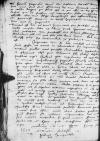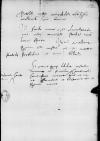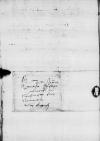 AAWO, AB, D. 3, f. 118r
AAWO, AB, D. 3, f. 118r
cf. Ioannes CAMPENSIS (Jan van CAMPEN) to Ioannes DANTISCUS Venice, 1535-02-04, CIDTC IDL 1274⌊Scripseramcf. Ioannes CAMPENSIS (Jan van CAMPEN) to Ioannes DANTISCUS Venice, 1535-02-04, CIDTC IDL 1274⌋ anno superiore e Venice (Venezia, Venetiae), city in northeastern Italy, capital of the Republic of Venice⌊VenetiisVenice (Venezia, Venetiae), city in northeastern Italy, capital of the Republic of Venice⌋ diligenter de statu, qui tunc erat rerum mearum per quendam Leonard Dawid ⌊IudaeumLeonard Dawid ⌋ Cracow (Kraków, Cracovia), city in southern Poland, Małopolska, on the Vistula river, from 1038 capital of the Kingdom of Poland⌊CracoviaeCracow (Kraków, Cracovia), city in southern Poland, Małopolska, on the Vistula river, from 1038 capital of the Kingdom of Poland⌋ degentem. Verum quantum ex nostro Nikolaus Nibschitz (Mikołaj Nipszyc) (*ca. 1483 – †1541), royal courtier, diplomat in the service of Sigismund I and Albrecht von Hohenzollern-Ansbach, Dantiscus' friend; from 1525 until his death an official representative of Duke Albrecht at the Cracow royal court; from 1532 royal secretary; 1519 royal envoy to Albrecht von Hohenzollern, Grand Master of the Teutonic Order, 1525, 1526 envoy to Hungary, 1527 envoy to the Congress in Wrocław, 1531-1533, 1537 envoy to Ferdinand I of Habsburg, 1535-1537, 1540 envoy to Brandenburg, 1536 envoy to the estates of Livonia⌊NybelschytzNikolaus Nibschitz (Mikołaj Nipszyc) (*ca. 1483 – †1541), royal courtier, diplomat in the service of Sigismund I and Albrecht von Hohenzollern-Ansbach, Dantiscus' friend; from 1525 until his death an official representative of Duke Albrecht at the Cracow royal court; from 1532 royal secretary; 1519 royal envoy to Albrecht von Hohenzollern, Grand Master of the Teutonic Order, 1525, 1526 envoy to Hungary, 1527 envoy to the Congress in Wrocław, 1531-1533, 1537 envoy to Ferdinand I of Habsburg, 1535-1537, 1540 envoy to Brandenburg, 1536 envoy to the estates of Livonia⌋, quem Bologna (Bononia), city in Italy at the southern end of the plain of the Po valley, between 1506 and 1860 it belonged to the Papal State⌊BononiaeBologna (Bononia), city in Italy at the southern end of the plain of the Po valley, between 1506 and 1860 it belonged to the Papal State⌋ sanum inveni, intellexi, litterae illae Reverendissimae Dominationi Tuae redditae non sunt, quae res me pessime habet, propterea quod metuam, ne ms. non(!)
⌈nene ms. non(!)
⌉ Reverendissima Dominatio Tua putet me beneficiorum acceptorum immemorem factum, quod priusquam fiat, mori me malim. Girolamo Aleandro (*1480 – †1542), born in Motta di Livenza; 1528-1541 Archbishop of Brindisi, 1538-1542 Cardinal-Priest of S. Crisogono ⌊AleandrumGirolamo Aleandro (*1480 – †1542), born in Motta di Livenza; 1528-1541 Archbishop of Brindisi, 1538-1542 Cardinal-Priest of S. Crisogono ⌋ plane talem inveni, qualem mihi eum saepe descripseras. Est nunc Rome (Roma), city in central Italy, on the Tiber river, seat of the Holy See⌊RomaeRome (Roma), city in central Italy, on the Tiber river, seat of the Holy See⌋, ubi primum locum ambit in futuro concilio, sed ridetur ab optimis quibusque. Fui apud eum mensibus quinque tanto taedio, quanto nusquam umquam. Ab eo discessurum ambivit me superinscribed⌈meme superinscribed⌉ nobilissimus, doctissimus et probissimus Anglus dominus Reginald Pole (*1500 – †1558), the last Catholic archbishop of Canterbury; 1537 cardinal-deacon of Ss. Nereo ed Achilleo; 1540 - of Ss. Vito, Modesto e Crescenzia, and S. Maria in Cosmedin; 1555 cardinal-priest of S. Maria in Cosmedin; 1556 archbishop of Canterbury⌊Reginaldus PolusReginald Pole (*1500 – †1558), the last Catholic archbishop of Canterbury; 1537 cardinal-deacon of Ss. Nereo ed Achilleo; 1540 - of Ss. Vito, Modesto e Crescenzia, and S. Maria in Cosmedin; 1555 cardinal-priest of S. Maria in Cosmedin; 1556 archbishop of Canterbury⌋, apud quem toto fere anno fui humanissime exceptus. Ab illo cum discedere constituissem et me in patriam studiose revocatum recipere, rescivit de discessu meo superinscribed⌈de discessu meode discessu meo superinscribed⌉ Gian Matteo Giberti (*1495 – †1543), patron of the arts and letters, member of the Roman Academy; one of the most trusted advisers to popes Leo X and Clement VII; in 1536 member of the commission of nine cardinals and prelates (decreed by the Fifth Lateran Council) which drafted the "Consilium de emendanda ecclesia"; 1514 secretary to Cardinal Giulio de'Medici (future Clement VII); 1519 - secretary to Leo X; Notary of the apostolic chancery; 1523 Datary (in charge of distributing benefices); 1524 Bishop of Verona; 1521 envoy of Cardinal Giulio de'Medici to Alfonso I d'Este, Charles V, and Cardinal Thomas Wolsey; 1534 papal nuncio to Venice; 1537 papal legate to France (with cardinal Reginald Pole) (CE, vol. 2, p. 94-96)⌊episcopus VeronensisGian Matteo Giberti (*1495 – †1543), patron of the arts and letters, member of the Roman Academy; one of the most trusted advisers to popes Leo X and Clement VII; in 1536 member of the commission of nine cardinals and prelates (decreed by the Fifth Lateran Council) which drafted the "Consilium de emendanda ecclesia"; 1514 secretary to Cardinal Giulio de'Medici (future Clement VII); 1519 - secretary to Leo X; Notary of the apostolic chancery; 1523 Datary (in charge of distributing benefices); 1524 Bishop of Verona; 1521 envoy of Cardinal Giulio de'Medici to Alfonso I d'Este, Charles V, and Cardinal Thomas Wolsey; 1534 papal nuncio to Venice; 1537 papal legate to France (with cardinal Reginald Pole) (CE, vol. 2, p. 94-96)⌋ oravitque per litteras obnixe, ut paululum a recto in patriam itinere ad se deflecterem. Quod cum fecissem, tam me excepit humaniter et exceptum tractavit, ut tota fere hieme apud illum manserim eique et aliis aliquot, quos secum habet, doctis viris prophetas omnes praelegerim, mutatis locis, ubi nostra editio ab Hebraeo variat, et ascriptis annotatiunculis quibusdam in margine ad explicanda obscuriora prophetarum loca, totum praeterea Paul of Tarsus, Saint (*5-10 AD – †64-67 AD), the most important missionary and theologian of early Christianity, known as the Apostle of Nations, author of Letters, the main figure of the Acts of the Apostles⌊PaulumPaul of Tarsus, Saint (*5-10 AD – †64-67 AD), the most important missionary and theologian of early Christianity, known as the Apostle of Nations, author of Letters, the main figure of the Acts of the Apostles⌋, Job the central character of the Book of Job in the Bible⌊IobJob the central character of the Book of Job in the Bible⌋ et quinque libros Moses religious leader, lawgiver, and prophet⌊MosiMoses religious leader, lawgiver, and prophet⌋. Omnia haec, quamvis incredibile Dominationi Tuae Reverendissimae videatur, plus minus quinque mensibus absolvimus. Cum iam inde morem illi gessissem et sciret me properare in patriam nec ulla ratione retineri posse iamque ego ad iter accinctus essem, de improviso a Gasparo Contarini (*1483 – †1542), philosopher and theologian, Venetian diplomat; member of papal commission for church reform in years 1536-1540, withdrawn from its work under suspition of supporting the Reformation; 1515 Venetian avogador del comun; 1521-1525 ambassador to emperor Charles V; 1525 captain of Brescia; 1530 head of the Venetian Council of Ten; 1535 elevated to cardinal; 1541 papal legate to the diet of Regensburg (CE, vol. 1, p. 334-335)⌊cardinaleGasparo Contarini (*1483 – †1542), philosopher and theologian, Venetian diplomat; member of papal commission for church reform in years 1536-1540, withdrawn from its work under suspition of supporting the Reformation; 1515 Venetian avogador del comun; 1521-1525 ambassador to emperor Charles V; 1525 captain of Brescia; 1530 head of the Venetian Council of Ten; 1535 elevated to cardinal; 1541 papal legate to the diet of Regensburg (CE, vol. 1, p. 334-335)⌋ quodam, viro optimo et doctissimo mihique Venice (Venezia, Venetiae), city in northeastern Italy, capital of the Republic of Venice⌊VenetiisVenice (Venezia, Venetiae), city in northeastern Italy, capital of the Republic of Venice⌋, priusquam cardinalis esset, familiarissime noto, ab hoc, inquam, de improviso Rome (Roma), city in central Italy, on the Tiber river, seat of the Holy See⌊RomamRome (Roma), city in central Italy, on the Tiber river, seat of the Holy See⌋ vocor, suggerente, ut suspicor Paul III (Alessandro Farnese) (*1468 – †1549), 1493 elevated to cardinal; 1524 Cardinal-Bishop of Ostia; 1534-1549 Pope⌊pontificePaul III (Alessandro Farnese) (*1468 – †1549), 1493 elevated to cardinal; 1524 Cardinal-Bishop of Ostia; 1534-1549 Pope⌋. Quamquam numquam animum habui  AAWO, AB, D. 3, f. 118v ad Rome (Roma), city in central Italy, on the Tiber river, seat of the Holy See⌊RomamRome (Roma), city in central Italy, on the Tiber river, seat of the Holy See⌋ propensum, tamen diu haesitans tandem hinc huc veni sub finem Februarii huius anni. Invenit me Rome (Roma), city in central Italy, on the Tiber river, seat of the Holy See⌊hicRome (Roma), city in central Italy, on the Tiber river, seat of the Holy See⌋ dominus doctor Longus, qui sollicite egit, ut per illum Dominationi Tuae Reverendissimae scriberem, quod et fecissem, nisi intempestive falso me gaudio affecisset olim tuus Hugo Bruxellensis, qui affirmabat Dominationem Tuam pervenisse Naples (Napoli, Neapolis), city in Italy, on the coast of the Tyrrhenian Sea, capital of the region of Campania⌊NeapolimNaples (Napoli, Neapolis), city in Italy, on the coast of the Tyrrhenian Sea, capital of the region of Campania⌋ in aulam Charles V of Habsburg (*1500 – †1558), ruler of the Burgundian territories (1506-1555), King of Spain as Charles I (1516-1556), King of Naples and Sicily, King of the Romans (1519-1530), Holy Roman Emperor of the German Nation (elected 1519, crowned 1530, abdicated 1556); son of Philip I the Handsome and Joanna the Mad of Castile⌊imperatorisCharles V of Habsburg (*1500 – †1558), ruler of the Burgundian territories (1506-1555), King of Spain as Charles I (1516-1556), King of Naples and Sicily, King of the Romans (1519-1530), Holy Roman Emperor of the German Nation (elected 1519, crowned 1530, abdicated 1556); son of Philip I the Handsome and Joanna the Mad of Castile⌋ venturamque huc una cum imperatore.
AAWO, AB, D. 3, f. 118v ad Rome (Roma), city in central Italy, on the Tiber river, seat of the Holy See⌊RomamRome (Roma), city in central Italy, on the Tiber river, seat of the Holy See⌋ propensum, tamen diu haesitans tandem hinc huc veni sub finem Februarii huius anni. Invenit me Rome (Roma), city in central Italy, on the Tiber river, seat of the Holy See⌊hicRome (Roma), city in central Italy, on the Tiber river, seat of the Holy See⌋ dominus doctor Longus, qui sollicite egit, ut per illum Dominationi Tuae Reverendissimae scriberem, quod et fecissem, nisi intempestive falso me gaudio affecisset olim tuus Hugo Bruxellensis, qui affirmabat Dominationem Tuam pervenisse Naples (Napoli, Neapolis), city in Italy, on the coast of the Tyrrhenian Sea, capital of the region of Campania⌊NeapolimNaples (Napoli, Neapolis), city in Italy, on the coast of the Tyrrhenian Sea, capital of the region of Campania⌋ in aulam Charles V of Habsburg (*1500 – †1558), ruler of the Burgundian territories (1506-1555), King of Spain as Charles I (1516-1556), King of Naples and Sicily, King of the Romans (1519-1530), Holy Roman Emperor of the German Nation (elected 1519, crowned 1530, abdicated 1556); son of Philip I the Handsome and Joanna the Mad of Castile⌊imperatorisCharles V of Habsburg (*1500 – †1558), ruler of the Burgundian territories (1506-1555), King of Spain as Charles I (1516-1556), King of Naples and Sicily, King of the Romans (1519-1530), Holy Roman Emperor of the German Nation (elected 1519, crowned 1530, abdicated 1556); son of Philip I the Handsome and Joanna the Mad of Castile⌋ venturamque huc una cum imperatore.
Decretum est hic ad preces imperatoris per pontificem et cardinales consistorialiter, ut liberum, quale The Germans ⌊GermaniThe Germans ⌋ volunt, concilium indicatur circa Pentecosten anni futuri Mantua (Mantova), city in northern Italy⌊MantuaeMantua (Mantova), city in northern Italy⌋ aut Milan (Mediolanum, Milano), city in northern Italy⌊MediolaniMilan (Mediolanum, Milano), city in northern Italy⌋, non enim certe scio, utro horum locorum. Res concilii commissae sunt sex cardinalibus, ex quibus dominus meus unus est.
Imperator tam se hic modeste cum omnibus suis gessit, ut omnes in admirationem sui rapuerit. Habuit orationem publice coram pontifice, cardinalibus, oratoribus et plurimis aliis, qua declaravit sibi plurimum displicere perfidiam Francis I of Valois (*1494 – †1547), 1515-1547 King of France; son of Charles, Count of Angoulême, and Louise of Savoy⌊regis GallorumFrancis I of Valois (*1494 – †1547), 1515-1547 King of France; son of Charles, Count of Angoulême, and Louise of Savoy⌋, qua impediretur ab expeditione in The Ottoman Turks (Turcae) ⌊TurcasThe Ottoman Turks (Turcae) ⌋ impedireturque progressus concilii celebrandi. Inter cetera hoc maxime maiestatem illius male habet, quod rex publice editis in France (Gallia, Francia), the kingdom⌊GalliaFrance (Gallia, Francia), the kingdom⌋ litteris ad principes Germany (Germania, Niemcy)⌊GermaniaeGermany (Germania, Niemcy)⌋ imperatorem dicat ambire monarchiam, cum non solum nihil vel illius vel cuiusquam alterius Christiani principis ambierit, sed etiam Milan (Mediolanum, Milano), duchy in northern Italy⌊ducatum MediolanensemMilan (Mediolanum, Milano), duchy in northern Italy⌋ contentus sit filio illius minimo natu dare, ut effusio Christiani sanguinis vitetur. Obtulit praeterea, si de privato agatur odio, se singulari certamine congressurum cum illo vel nudum vel quocumque modo paribus armis induto congressurum. Missus fuit a Francis I of Valois (*1494 – †1547), 1515-1547 King of France; son of Charles, Count of Angoulême, and Louise of Savoy⌊rege GalliaeFrancis I of Valois (*1494 – †1547), 1515-1547 King of France; son of Charles, Count of Angoulême, and Louise of Savoy⌋ cardinalis Lothringiae ad imperatorem et deinde ad pontificem huc Rome (Roma), city in central Italy, on the Tiber river, seat of the Holy See⌊RomamRome (Roma), city in central Italy, on the Tiber river, seat of the Holy See⌋ in causa huius conceptae pacis tractandae. Is hinc abiit et iterum e France (Gallia, Francia), the kingdom⌊GalliaFrance (Gallia, Francia), the kingdom⌋ rediisse Lucam ad imperatorem dicitur.
Paul III (Alessandro Farnese) (*1468 – †1549), 1493 elevated to cardinal; 1524 Cardinal-Bishop of Ostia; 1534-1549 Pope⌊PontifexPaul III (Alessandro Farnese) (*1468 – †1549), 1493 elevated to cardinal; 1524 Cardinal-Bishop of Ostia; 1534-1549 Pope⌋ semel decreverat proficisci Bologna (Bononia), city in Italy at the southern end of the plain of the Po valley, between 1506 and 1860 it belonged to the Papal State⌊BononiamBologna (Bononia), city in Italy at the southern end of the plain of the Po valley, between 1506 and 1860 it belonged to the Papal State⌋, paulo post mutatum fuit consilium, nunc iterum dicitur profecturus. Quid futurum sit, nescimus. Dicuntur hic multa, sed incertis auctoribus. Si quid nactus fuero certi, scribam Dominationi Tuae Reverendissimae, quam diutissime felicem vivere cupio. Valeat Dominatio Tua Reverendissima.
 AAWO, AB, D. 3, f. 118v ad
AAWO, AB, D. 3, f. 118v ad 


